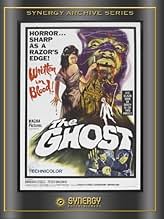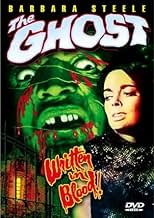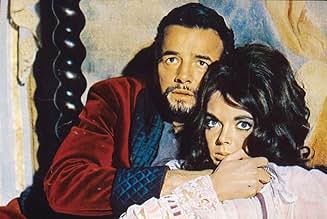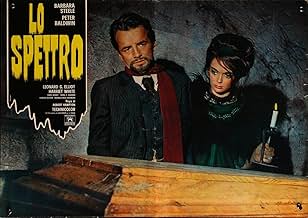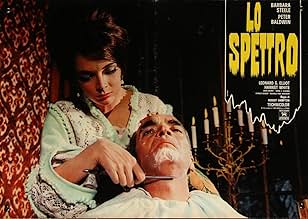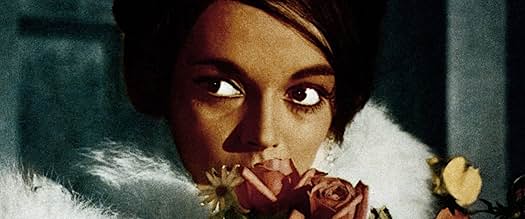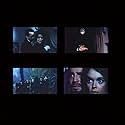IMDb-BEWERTUNG
6,1/10
1558
IHRE BEWERTUNG
Füge eine Handlung in deiner Sprache hinzuA woman and her lover murder her doctor husband, but when strange things start happening, they wonder if they really killed him, or if he has come back from the dead to haunt them.A woman and her lover murder her doctor husband, but when strange things start happening, they wonder if they really killed him, or if he has come back from the dead to haunt them.A woman and her lover murder her doctor husband, but when strange things start happening, they wonder if they really killed him, or if he has come back from the dead to haunt them.
- Auszeichnungen
- 1 Nominierung insgesamt
Elio Jotta
- Dr. John Hichcock
- (as Leonard G. Elliot)
Harriet Medin
- Catherine Wood - Housekeeper
- (as Harriet White)
Carlo Kechler
- Police Superintendent
- (as Charles Kechler)
Umberto Raho
- Canon Owens
- (as Raoul H. Newman)
Empfohlene Bewertungen
Riccardo Freda's "Lo Spettro" aka. "The Ghost" of 1963 is yet another delightfully uncanny Italian Gothic Horror film starring the wonderful Barbara Steele (my favorite actress), and while it cannot possibly compare to the absolute highlights in Steele's career, such as Mario Bava's masterpiece "La Maschera Del Demonio" ("Black Sunday", 1960), Roger Corman's "Pit and the Pendulum" (1961, also starring the great Vincent Price) or Antonio Margheriti's "Danza Macabra" ("Castle of Blood", 1964), this is another mesmerizing experience that no lover of Gothic greatness can afford to miss. "Lo Spettro" is a sequel to Freda's earlier Gothic Horror film, "L'Orribile Segreto Del Dr. Hichcock" ("The Horrible Dr. Hitchcock", 1962; they obviously left out a "t" in order to avoid legal difficulties), also starring Steele, which I haven't yet seen. Her character is named 'Margaret' in this film whereas the name was 'Cynthia' in "Dr. Hichcock. This film doesn't require having seen "Dr. Hichcock" , however.
Scotland, 1910: The brilliant, but critically ill, wheelchair-bound Dr. Hichcock (Elio Jotta), who needs to take lots of medications against his mysterious disease, is working on a serum to cure paralysis. His beautiful young wife Margaret (Barbara Steele) is having an affair with his assistant/colleague Dr. Livingstone (Peter Baldwin), however, and the two do not intend to wait for the old Doctor to pass away by natural reasons. Shortly after his funeral, creepy things begin to happen in the uncanny mansion...
As mentioned above, the ravishing Barbara Steele, is my favorite actress, and she is once again great here. In my humble opinion, no other actress was ever capable of blending incomparable beauty with a genius for the uncanny as it is the case with this unchallenged Goddess of Gothic Horror, and no other actress ever will. Under the solid direction of Riccardo Freda, Miss Steele plays yet another typical role with typical greatness. As the credited director of the first (post-WW2) Italian Horror film, "I Vampiri" of 1957, Freda deserves praise as one of the pioneers of Italian Horror, though it must be said that it was actually the great Mario Bava (my choice for the greatest Horror director of all-time) who completed that gem and who is arguably responsible for its greatness. Besides our beloved Barbara, the rest of the cast is also very good, especially Elio Jotta is great as the sinister Dr. Hichcock. William Baldwin is good enough as Dr. Livingstone, as is Harriet Medin as the housekeeper, and the cast furthermore includes Umberto Raho, whom Italian Horror fans might recognize as a regular supporting actor in many films (including Margheriti's "Castle of Blood", Bava's "Baron Blood" and Ubaldo Ragona's "The Last Man on Earth" starring Vincent Price).
The film is almost entirely set inside Dr. Hichcocks eerie, castle-like mansion, which is a terrific setting for old-fashioned Goth-Horror indeed. Franco Mannino's score, which mainly consists of an eerily beautiful theme that is replayed throughout the film, greatly increases the film's rich atmosphere. Overall, "Lo Spettro" is not one of the greatest films in Barbara Steele's filmography, but it still is a very good and creepy Gothic Horror film that none of her fans could possibly afford to miss. Barbara Steele is once again stunningly beautiful, and brilliantly sinister - I simply cannot find enough words to adequately praise this wonderful lady. Barbara, we worship you!
Scotland, 1910: The brilliant, but critically ill, wheelchair-bound Dr. Hichcock (Elio Jotta), who needs to take lots of medications against his mysterious disease, is working on a serum to cure paralysis. His beautiful young wife Margaret (Barbara Steele) is having an affair with his assistant/colleague Dr. Livingstone (Peter Baldwin), however, and the two do not intend to wait for the old Doctor to pass away by natural reasons. Shortly after his funeral, creepy things begin to happen in the uncanny mansion...
As mentioned above, the ravishing Barbara Steele, is my favorite actress, and she is once again great here. In my humble opinion, no other actress was ever capable of blending incomparable beauty with a genius for the uncanny as it is the case with this unchallenged Goddess of Gothic Horror, and no other actress ever will. Under the solid direction of Riccardo Freda, Miss Steele plays yet another typical role with typical greatness. As the credited director of the first (post-WW2) Italian Horror film, "I Vampiri" of 1957, Freda deserves praise as one of the pioneers of Italian Horror, though it must be said that it was actually the great Mario Bava (my choice for the greatest Horror director of all-time) who completed that gem and who is arguably responsible for its greatness. Besides our beloved Barbara, the rest of the cast is also very good, especially Elio Jotta is great as the sinister Dr. Hichcock. William Baldwin is good enough as Dr. Livingstone, as is Harriet Medin as the housekeeper, and the cast furthermore includes Umberto Raho, whom Italian Horror fans might recognize as a regular supporting actor in many films (including Margheriti's "Castle of Blood", Bava's "Baron Blood" and Ubaldo Ragona's "The Last Man on Earth" starring Vincent Price).
The film is almost entirely set inside Dr. Hichcocks eerie, castle-like mansion, which is a terrific setting for old-fashioned Goth-Horror indeed. Franco Mannino's score, which mainly consists of an eerily beautiful theme that is replayed throughout the film, greatly increases the film's rich atmosphere. Overall, "Lo Spettro" is not one of the greatest films in Barbara Steele's filmography, but it still is a very good and creepy Gothic Horror film that none of her fans could possibly afford to miss. Barbara Steele is once again stunningly beautiful, and brilliantly sinister - I simply cannot find enough words to adequately praise this wonderful lady. Barbara, we worship you!
As you might expect, this film is really quite similar to Riccardo Freda's earlier horror flick "The Terror of Dr Hitchcock", although for my money; I'd say this one is slightly better. The two films share a director and a lead actress in common, as well as a lead character name. This film firmly fits into the 'Gothic' side of Italian cinema, which Steele often starred in, and Freda makes excellent use of this style with some real standout cinematography. It became clear that Riccardo Freda was, in fact, a hack; as it turned out that the great Mario Bava did most of the work on a lot of his films, and his later stuff - Tragic Ceremony and The Iguana with the Tongue of Fire to name a couple - was a million miles away from being brilliant. This film would appear to be Freda at his best, therefore, and it's actually not bad. The plot centres on Dr. John Hitchcock; a cripple who wants to die. His wife is, naturally, having an affair with her husband's doctor, and pretty soon the two of them conspire to murder Dr Hitchcock for his money. However, they didn't bargain for him haunting them after his death...
The film's title suggests that it's a ghost story, but I would say that The Ghost is more of a mystery chiller. There's not a great deal of real bona fide horror, and to be honest; I felt the film was a little too talky and would have proffered it to be a bit more visceral. The film's main draw is, obviously, Barbara Steele and the 'Queen of Horror' looks great throughout the film. The decor and set design is great too, and these allow Freda to build an oppressive and macabre atmosphere, which benefits the plot line quite well. The main problem with the film is the fact that a lot of it feels really amateurish. The dubbing is atrocious (even more so than usual) and some of the things the characters say are ridiculous. Whether or not that's down to the translation, I don't know. The climax is the best part of the film for me. Of course, it's not a completely sense-making ending and there are a few holes left; but it's a nice twist at least, and it does justify the shortfalls of some of the rest of the movie. Overall, I won't go as far as to say that The Ghost is a horror classic; but it's good entertainment, and fans of Gothic horror will enjoy it.
The film's title suggests that it's a ghost story, but I would say that The Ghost is more of a mystery chiller. There's not a great deal of real bona fide horror, and to be honest; I felt the film was a little too talky and would have proffered it to be a bit more visceral. The film's main draw is, obviously, Barbara Steele and the 'Queen of Horror' looks great throughout the film. The decor and set design is great too, and these allow Freda to build an oppressive and macabre atmosphere, which benefits the plot line quite well. The main problem with the film is the fact that a lot of it feels really amateurish. The dubbing is atrocious (even more so than usual) and some of the things the characters say are ridiculous. Whether or not that's down to the translation, I don't know. The climax is the best part of the film for me. Of course, it's not a completely sense-making ending and there are a few holes left; but it's a nice twist at least, and it does justify the shortfalls of some of the rest of the movie. Overall, I won't go as far as to say that The Ghost is a horror classic; but it's good entertainment, and fans of Gothic horror will enjoy it.
This film perhaps holds up better than the first Dr. Hitchcock film and can be seen with or without that film. It stands on its own. A good film for people to be introduced to director Freda's work with. It gets better with repeated viewings and the music score is very good. This is not, just as none of his films are, a supernatural movie. So just know that going in. The film still has a good Gothic feel to it. Sadly there is no really good DVD release version of the film. There is a key and very graphic murder scene that is either cut down or cut completely out of several versions available. Without that being intact the impact of the later part of the film is really reduced. Think about Psycho if you basically cut out the shower scene. Not that this is in Psycho's league but this scene I'm talking about really makes this film work. It would be nice if Freda's films got a box set release of proper versions of his film. He started Mario Bava's career and Argento says Freda had more of an influence on him than Bava was. For now you have to really look hard and watch pretty lousy versions of his films to try to discover him as a director. It's worth the effort but would be nice for him to get some decent releases.
Official/unofficial sequel to "The Horrible Dr. Hichcock" with the captivating Barbara Steele now playing the doctor's wife Margaret instead of Cynthia and Elio Jotta taking in the role of Dr. Hichcock himself. Titled simply "The Ghost" on my DVD collection the Dr. is now confined to a wheelchair and is administered small doses of a poison in order to dilute whatever is ailing him. Assisting him in his matters of health is the handsome Dr. Charles Livingstone who also is having an affair with Margaret. Late one night after a séance Margaret confides in Charles that she cannot take being around him anymore and that maybe he can administer a deadly dose of the poison to her husband in order for her to claim his inheritance and live together in the Gothic Scottish castle as the lovers they were meant to be. When Dr. Livingstone agrees and murders Dr. Hichcock the castle becomes haunted by the corpse with ghastly reminders of the dastardly deed. Complicating things even more is Dr. Hichcock's faithful housekeeper Catherine who seems to keep an attentive eye on Margaret and Charles' suspicious actions. When the Hichcock fortune turns up missing Margaret begins to wonder if her husband's ghost has hidden it or perhaps her beau hasn't been as truthful as she thinks he is. Dr. Livingstone I presume? Maybe.
Not much that hasn't been done before here though it is a pretty decent effort with a rather graphic scene for a movie made in the early sixties. Without a doubt this movie was augmented greatly by the performance of the large-eyed "Queen of Gothic Horror" Barbara Steele. Her portrayal of a wife with so much disgust for her crippled husband which is trumped only by her greed is powerfully done. The climax actually proves that Margaret and Dr. Hichcock were cut from the same cloth concerning the lack of morality and how they treat others to gain what they think should be theirs. Can become a little plodding during the 95 minute running time though the ending will keep you glued to the screen. The print of "The Ghost" unfortunately was taken from a degraded copy as some of the scenes jump from frame to frame which gets rather annoying from time to time. The dubbing at times are suspect as well. Funny how the setting was supposed to be in Scotland yet only one person spoke with a Scottish brogue and rather poorly at that. Not the greatest work I've seen from the Gothic horror genre though I believe fans of Barbara Steele would enjoy this.
Not much that hasn't been done before here though it is a pretty decent effort with a rather graphic scene for a movie made in the early sixties. Without a doubt this movie was augmented greatly by the performance of the large-eyed "Queen of Gothic Horror" Barbara Steele. Her portrayal of a wife with so much disgust for her crippled husband which is trumped only by her greed is powerfully done. The climax actually proves that Margaret and Dr. Hichcock were cut from the same cloth concerning the lack of morality and how they treat others to gain what they think should be theirs. Can become a little plodding during the 95 minute running time though the ending will keep you glued to the screen. The print of "The Ghost" unfortunately was taken from a degraded copy as some of the scenes jump from frame to frame which gets rather annoying from time to time. The dubbing at times are suspect as well. Funny how the setting was supposed to be in Scotland yet only one person spoke with a Scottish brogue and rather poorly at that. Not the greatest work I've seen from the Gothic horror genre though I believe fans of Barbara Steele would enjoy this.
I recently watched this film, which was part of a 10 pack horror collection that was put out by Brentwood. Unfortunately the source print for this dvd was a print that was in terrible condition, and barely watchable.
The first thing that struck me about this film was the music. Even during the opening credits I was watching the credits carefully to see who the composer was, half expecting it to be Ennio Morricone, (which it wasn't). If the music wasn't enough to hook me completely, seeing Barbara Steele on the screen, whom I immediately recalled from "Black Sabbath" definitely made me want to continue watching this film, bad print and all.
The setting of this film is a gloomy Scottish mansion, around the turn of the century. The young wife (Steele) of the creepy, crippled and rich Dr. Hitchcock, conspires with her handsome lover, to murder her husband. Her lover happens to be her husbands physician who is treating him by administering a lethal poison which is immediately followed with the antidote. Needless to say they decide not to administer the second part of the treatment one day and are able to fulfill their burning desire to be together, happy ,rich and rid of the husband. Unfortunately for them, things don't quite work out so well, and things begin to unravel during a succession of supernatural events that take place after the murder.
While this is a fairly predictable plot of greedy people being punished from beyond the grave, the director manages to create a suspenseful and atmospheric film, with some occasional well placed shockers. I thoroughly enjoyed this film and would love to see an uncut well preserved print of it.
The first thing that struck me about this film was the music. Even during the opening credits I was watching the credits carefully to see who the composer was, half expecting it to be Ennio Morricone, (which it wasn't). If the music wasn't enough to hook me completely, seeing Barbara Steele on the screen, whom I immediately recalled from "Black Sabbath" definitely made me want to continue watching this film, bad print and all.
The setting of this film is a gloomy Scottish mansion, around the turn of the century. The young wife (Steele) of the creepy, crippled and rich Dr. Hitchcock, conspires with her handsome lover, to murder her husband. Her lover happens to be her husbands physician who is treating him by administering a lethal poison which is immediately followed with the antidote. Needless to say they decide not to administer the second part of the treatment one day and are able to fulfill their burning desire to be together, happy ,rich and rid of the husband. Unfortunately for them, things don't quite work out so well, and things begin to unravel during a succession of supernatural events that take place after the murder.
While this is a fairly predictable plot of greedy people being punished from beyond the grave, the director manages to create a suspenseful and atmospheric film, with some occasional well placed shockers. I thoroughly enjoyed this film and would love to see an uncut well preserved print of it.
Wusstest du schon
- WissenswertesMade during the pseudonym craze of the 1960s, the music score was credited to "Franck Wallace." Italian composers usually registered their pseudonyms with their performing right society, the SIAE, and the identities were listed by Bianco e Nero and the Monthly Film Bulletin who both reported that Wallace was Franco Mannino. However, some reference sources such as Donald C. Willis in 1972 suggested "Franck Wallace" was a joint pseudonym for Mannino and Roman Vlad (the two composers sometimes collaborated and Wallace is a very rough transliteration of Vlad). Even more confusingly, Beat Records released the soundtrack in 2008 and discovered that the surviving tapes in the Nazionalmusic vaults were attributed to Francesco De Masi. So the CD went out credited to De Masi only. De Masi did not work with either of the other two composers, instead being asked at the behest of the director to do a new score, not liking Mannino's effort; what portions thereof are contained in the film, are unknown, as the director seemingly changed his mind again, as Mannino is credited in the film for the score.
- PatzerWhen Dr. Livingston removes the bullet from the wall, there is a close-up of him holding an entire cartridge in his hands.
- Zitate
Dr. John Hichcock: [hands around Margaret's throat] Feel how strong my grip is? But I won't kill you.
- VerbindungenFeatured in 100 Jahre Horror- und Gruselfilme: Ghosts (1996)
Top-Auswahl
Melde dich zum Bewerten an und greife auf die Watchlist für personalisierte Empfehlungen zu.
2025 Venice Film Festival Guide
2025 Venice Film Festival Guide
See the full lineup for the 2025 Venice Film Festival, taking place Aug. 27 – Sept. 9, 2025.
- How long is The Ghost?Powered by Alexa
Details
- Laufzeit1 Stunde 37 Minuten
- Sound-Mix
- Seitenverhältnis
- 1.85 : 1
Zu dieser Seite beitragen
Bearbeitung vorschlagen oder fehlenden Inhalt hinzufügen


